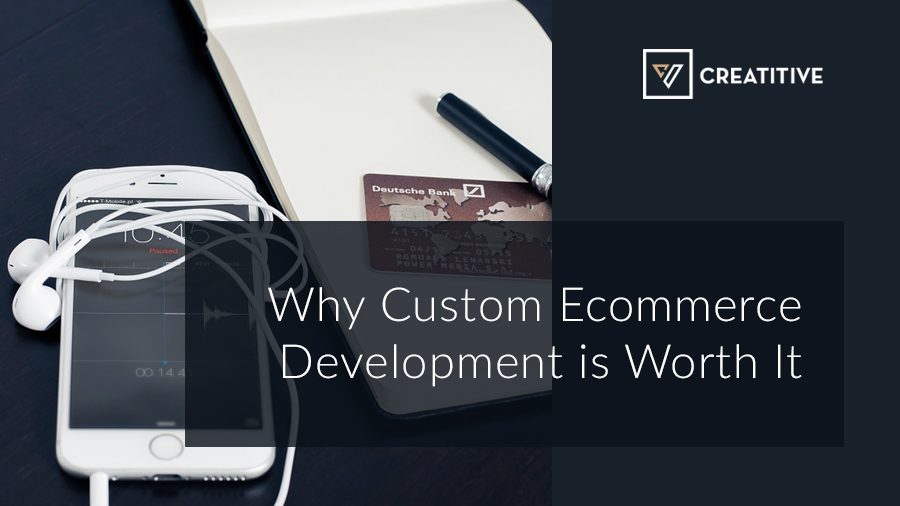

In business, eCommerce website development refers to developing the technical aspects of your eCommerce website—its functionality, how the site accepts payments, behaves in response to the user’s action, and materializes aesthetically.
Nearly 15% of sales are made online as internet shopping gradually overtakes the global retail business. You must have a complete eCommerce website if you want your small business to participate in the growing trend that this number represents.
A well-designed eCommerce website is more than just visually appealing. It gives a complete online shopping experience to your customer. By easing the ordering process for clients and creating brand equity that can sustain your firm, if carried out effectively, it will translate into actual sales and earnings for your small business.
Let’s explore the people and processes involved in eCommerce development and what you need to know to start your brand.
What is eCommerce Development?
An eCommerce website development service refers to creating and designing an eCommerce website. This is where consumers can shop online for your brand’s products.
Because eCommerce websites are so popular with consumers, developing eCommerce websites can help you generate leads, more conversions, and revenue for your business.
Making a website’s design prototype come to life and perform as a website as a whole is the primary duty of an eCommerce web developer. Web development is making a website’s design work as it should.
A web developer would, for instance, make sure that all navigational buttons, contact forms, calls to action (CTAs), and hyperlinks work as they should, and it is a matter of just a few clicks to make a purchase finally.
Custom eCommerce web development: What is it?
The process of designing, building, and deploying an eCommerce website specifically for a group of users, tasks, or organizations is known as eCommerce web development. Instead of commercial off-the-shelf (COTS) software, eCommerce platforms focus on meeting specific needs.
Custom eCommerce development involves conducting a thorough analysis of the needs of each business to create an eCommerce solution specific to that firm. This needs in-depth research on the business objectives and the business vision.
An in-house team, web development services provider, or external contractors often handle creating custom eCommerce platforms. eCommerce developers follow the same procedures and methodology as other website development processes.
A custom project would gather requirements, write code, ensure website security, and deploy it. It would also use Agile, DevOps, or Rapid Application Development methodologies.
Website management, modernization, and customization efforts are connected to creating digital solutions. Customization involves altering commercially available software to meet specific needs.
eCommerce Website Development Services and the Advantages
Because it is simple and highly economical, an off-the-shelf eCommerce product can occasionally appear profitable. However, people do not seem to comprehend that a generic product may cost more. These are the benefits of developing custom eCommerce solutions:
Bounce Rate and Conversion Improvement:
A personalized eCommerce solution can delight your clients better, enhancing conversions and fostering customer loyalty.
An improved SEO strategy
An off-the-shelf eCommerce product is created for customer engagement and, as a result, only offers basic SEO capabilities that are not targeted at a particular brand or corporation.
With a tailored offering, you may adequately manage your search engine optimization requirements and other digital marketing criteria precisely for your sector.
Managing Specialized Processes
Customers who utilize an eCommerce platform may have several front-end and back-end needs, such as checkout, payment choices, customer care, etc.
One would require verification before making a purchase, and the other might require credit checks before making a significant purchase, both of which are doable with a personalized eCommerce website.
Integration with your Business
For optimum performance, the eCommerce platform might need to combine your business model and eCommerce marketing plan.
Create a pleasing appearance
With a tailored platform, you can modify the look and feel of your eCommerce website with superb photos, an excellent user interface, a seamless checkout procedure, etc., on desktops, laptops, smartphones, and other mobile devices.
eCommerce Websites vs. Standard Websites
Websites rule the world today. Nearly all companies have websites and those who don’t are losing out on several advantages. There are various types of websites. In this post, you may learn more about the distinctions between informational and eCommerce websites and other essential details.
First off, even though both are websites, what distinguishes them from one another is that they perform different functions and satisfy different business needs. You may see what distinguishes these websites, the inspiration for their conception, and the demographics of their intended users here.
eCommerce websites are another term for online stores. Running an eCommerce business allows your brand to make sales in online stores. It is essential to note that selling to consumers online is vastly different than selling to them in person.
eCommerce web developers have to provide the best customer experience with their design.
They don’t have the chance to preview your products, feel them, or see the actual colors and quality, and instead must rely on your eCommerce website design to show off the details and the value of every item you sell. This needs technical expertise.
An eCommerce website is created expressly to make it easier to conduct online business or digital commercial transactions.
Auction sites, retail businesses, business-to-business services, financial management websites, and music websites are just a few examples of eCommerce websites. This differs from standard websites as it’s more retail-intensive.
Who is a Custom eCommerce Developer?
A specialist in eCommerce development creates mobile applications and websites expressly to meet the demands of their clients. They comprehend Java, JavaScript, PHP, Python, and CSS quite well. eCommerce website developers handle the technical details and the design of the merchandise.
eCommerce businesses want to ensure customers have a fully functional purchasing experience. eCommerce has transformed both sales and the purchasing process for customers. There is nothing to impede the business’s rapid growth.
Some Advice for Finding and Working with eCommerce Developers
The top development team can be chosen in the following ways for the best eCommerce web design:
Check for credibility
You must ascertain the reliability of the offshore consulting company you are about to hire. To make the best decision, get in touch with former customers to learn more about their experiences.
Discuss their business processes
You need to elicit information from them regarding the methods used to keep in touch with the client and assign developers to different projects. It’s crucial to find out if they are flexible.
Get the most recent codes
You should always make sure you have access to the rules that are being created. So it’s imperative always to have these on hand.
Become involved
You need to work with your small crew and demonstrate your abilities as a founder. You cannot, in way, shape, or form, alienate them.
Don’t accept a too-cheap company
Keep in mind that you want to be economical. If you work with a company that appears to be inexpensive but produces subpar work, you will eventually need to have adjustments made, which will cost money.
How eCommerce Web Developers Differ
Relying solely on a website to sell products and gain loyal customers is tricky, and you don’t often get a second chance. That’s why eCommerce development is a branch of software development. It requires a better understanding of your target market and consumers, in general, to gain prospective customers and convert them into paying customers.
An eCommerce website developer is skilled in development services, eCommerce solutions, custom eCommerce, online retail business, payment gateways, eCommerce web design, market entry consulting, and supply chain management. He is from a leading eCommerce development company and understands the eCommerce website development process.
Unsurprisingly, the ability to create a functional and user-friendly eCommerce website is one of the most valuable skills an eCommerce developer can possess. Even if they have prior experience with a dropshipping website builder, some practice will allow them to create some of the top dropshipping websites.
Your eCommerce site’s design should make it simple to accept various payment methods, including ACH payments.
Qualities of a Great eCommerce Site
good UI/UX
A good user interface (UI) and user experience (UX) design will be present on a successful eCommerce website. Filters that enable buyers to quickly identify their chosen product or range of products, a search bar, a clean eCommerce web design, and a legible copy are fundamental components of effective UI/UX in an eCommerce setting.
Search Engine Optimization (SEO)
Once a website is created, it must be able to rank in search engines if you want to attract visitors. The finest strategies to follow to rank a site should be known to an eCommerce developer.
Technical SEO and off-page SEO approaches are included in this data analysis. Suppliers and those learning how to operate a warehouse can use this data.
A good website goes to waste without being built for search engine optimization. A good design and development agency will improve your search visibility with sites that include onsite SEO, search management, basic design, keyword research, SEO-friendly content, offsite SEO, and wireframe design.
This way, you will start with an SEO-friendly site optimized for both the user and the explore page.
Search engine optimization improves the quality and quantity of traffic to a site or a web page from search engines. SEO targets unpaid traffic rather than direct traffic or paid traffic.
A website that performs well in search engine optimization is more accessible because of its positioning on Google.
reliable online security
Your eCommerce site’s security and the protection of any data it processes or saves are of the utmost importance. Credit card numbers and mailing addresses are the private financial data you handle from customers.
Best practices for eCommerce customer security include using “transport layer security” (TLS), “secure sockets layers” (SSL), and HTTPS authentication programs that authenticate and encrypt links between customer computers and your site.
Don’t use easy-to-guess passwords on your site or any other sensitive accounts. You can also guarantee that antivirus and anti-malware software is installed on all company devices.
Exceptional mobile experience
Internet users are using their phones more and more frequently. In light of this, more online customers are also spending more time searching on mobile devices.
By automatically reformatting your desktop site for a mobile screen, responsive design is a terrific method to improve your site’s mobile customer experience.
Most DIY web design platforms, such as Squarespace and Wix, offer responsive design by default; any web designer you employ in 2022 should have the most recent skills to fulfill your need for this design capability.
Steps of the eCommerce Development Process
Create your brand
Making decisions is necessary for brand establishment in an eCommerce setting. Are you running a business-to-business (B2B) or business-to-consumer (B2C) website?
Your eCommerce project should be customized to your target audience’s wants and preferences, from the picture style to the level of detail in the product descriptions.
Finally, you should think of a catchy company name – something distinctive and memorable that accurately reflects your brand’s vision.
Invest in a Domain Name
You might also consider domain name availability when deciding on a name for your eCommerce company. Although purchasing a character is simple, popular domains occasionally sell out quickly.
If the part you want is still available, attempt to secure it as soon as possible. You might want to see what URLs are available before deciding on a company name to improve brand awareness and generate traffic to your eCommerce site.
Select a Hosting System
After acquiring your domain, you can launch your website by selecting a web host (ideally one that has an eCommerce platform) to host it.
Others offer pre-built website designs suitable for desktop and mobile viewing, while some hosting services are more basic and need you to design and develop the website yourself.
Create your eCommerce Website Design
Beyond a memorable logo and striking color scheme, your website design should convey your company’s objectives. Because this is the primary operation of your eCommerce website, take great care while building an intuitive online store with simple search and filtering options.
Sales can be lost, and a brand’s reputation can suffer due to a disorganized website design or a complex checkout process. You can also avail of eCommerce website design services.
Create and Publish your eCommerce Website
Using a platform like Shopify to create your website using a prefab approach – dropping pre-coded content blocks and picture placeholders into a site-building interface could help you save money on web development expenditures.
If you have a little extra money to spend, you can still design your website individually with a developer, then migrate the site over using a hosting platform like Shopify.
Identify the Order Fulfillment Process
Which method of eCommerce fulfillment will you choose? Dropshipping (buying products directly from suppliers on behalf of clients), in-house fulfillment, or third-party logistics (completely outsourcing fulfillment processing)?
These will influence your site’s look and your ability to accept orders. Ensure your ad content sufficiently informs clients of when they may expect to get their package, for example, if you depend on a third-party logistics firm and they have an average delivery time range.
Upkeep your eCommerce Website
Your eCommerce website will need to be updated frequently to reflect changes in your inventory, product line, and ongoing specials.
Your marketing team might discover that some aspects of your eCommerce development need to be changed due to user feedback or that it lacks functionality that you or your clients require. Ecommerce websites, in contrast to physical stores, can be modified with simple development resources.
Elements to Establish an eCommerce Website
Establish Clear Business Goals
You want the best for your online store: consistent growth, better reach, a leading edge against competitors, and the best customer experience.
But getting those things isn’t always easy. It takes patience, dedication, and, most importantly, the ability to establish clear business goals.
Understand Your Consumer
You must first understand your customers when developing a new brand or updating your old brand strategy. Ask yourself what problems you solve.
Why should your brand resonate in consumers’ minds in a constantly changing world? Is your brand user-friendly, do you create a solution, and are your services niche?
Research the Current Market
Research is explorative and systematic work that increases an employee’s stock of knowledge. It involves collecting, organizing, and analyzing information to advance understanding of a topic or issue. A research project may be an expansion of past work in the field. It is the development of eCommerce business models.
Communicate Your Why
When creating a clear vision and why for your brand, it’s an excellent idea to complete customer interviews with your ideal customer. This helps to understand the client’s perspective better.
This interview typically includes a branding questionnaire with insight into the personal brand, a creative brief, and a few questions on what problems the consumer has, why they would or wouldn’t spend time and resources on your product or service, and what other tools or products would be of interest.
Branding questionnaires may also include visuals and other creative elements to understand a client’s first impression and appeal or lack thereof to specific components of a client’s brand identity.
In business, eCommerce website development refers to developing the technical aspects of your eCommerce website—its functionality, how the site accepts payments, behaves in response to the user’s action, and materializes aesthetically.
With a better understanding of the people and processes involved in eCommerce development, the next step is to get started with your brand.
What Factors can Affect your Budget for Developing an eCommerce Website?
You can choose the functionality and appearance of your website based on your budget. Do you want to create a brand-new custom eCommerce website, or do you need to add features, upgrade the security, and integrate a unique CRM?
You can estimate the amount of time required for development and the size of the team needed to complete this activity when you clearly understand the scope of the work.
Keep these crucial considerations in mind while estimating website pricing:
eCommerce website type (marketplace, online retailers, single brand.), type of employment (in-house, offshore, or nearshore outsourcing, staff augmentation, or freelancing.), eCommerce developer rates, alary rates depending on technology, location, seniority level, English knowledge, years of experience, and employment type.
Development of UI/UX,testing, front-end, and back-end development, the number of developers, and the intricate nature of web architecture.
Costs associated with PCI compliance, domain names, hosting, and SSL certificates
The number of third-party integrations (Stripe, PayPal payment integrations, CRM, social media API, notification, and pop-up integration.)
SEO enhancement
Throughout and after the entire web construction process, you must continuously assess your website for things like mobile friendliness and website loading speed, among other things.
SEO Ranking, which includes all the elements needed for a comprehensive website audit, can be used for that. (Total price will change based on the size of your website).
Maintainance
You should include the cost of this continuous eCommerce development service in your monthly expenses and period for development.
Why should you Outsource the Creation of a Custom eCommerce Website to a Development Company?
Cost-effectiveness
Budgetary concerns are the primary explanation for why most companies seem to fail. However, by outsourcing eCommerce development services, you won’t have to spend all your money on overhead expenses like payroll and office rent.
Hence, employing offshore developers would allow you to save money.
Increased Concentration on Core Business Operations
When you are free of the burden of covering multiple overhead expenses, you have more money at your disposal to invest in the things that matter most. Additionally, offshore developers charge less, enabling you to save even more money and develop your online store.
Increased Productivity and Time-Saving
Increased productivity and time savings are conceivable with offshore developers and potential financial savings. Because these eCommerce development companies are already professionals in their fields, you won’t need to invest time in training.
Access to the Most Recent Technologies and Professionals Worldwide
The establishment of an eCommerce website will require an array of technologies. You’ll hire some of the top eCommerce developers in the world who will significantly benefit your startup. eCommerce website development services are also provided by Creatitive.com. You can raise a query and relax until your eCommerce website is live.
Flexibility
As a young business, it’s critical to quickly scale the team to accommodate the new wave of technologies. However, an in-house team cannot make that happen. You can increase your company’s flexibility by outsourcing eCommerce development services.
Conclusion
One of the most crucial steps in growing your eCommerce business is creating a good eCommerce website, which is not a process to be taken lightly.
Before drafting a design and launch strategy, it is essential to assess your company’s demands and objectives because almost every choice you make, from your domain name to whether or not you decide to work with eCommerce website development services in the market.
Next, you must work with a seasoned supplier of eCommerce solutions to design, build, and promote a perfect online store that will produce countless business opportunities and the maximum return on investment.







